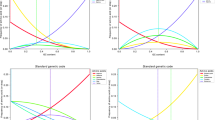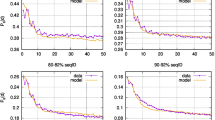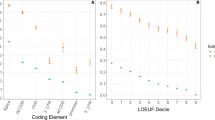Abstract
With the increasing availability of analytical information on mRNA molecules, it is now possible to compare homologous nucleotide sequences from different organisms and to draw conclusions about their evolution. Such comparisons1,2 have shown that silent changes in codons occur more frequently than nucleotide replacements that produce changes in amino acid sequences (code-altering changes). Furthermore, there is an important difference between amino acid sequence comparisons and nucleotide sequence comparisons. The former show only differences in amino acid residues, but the latter show several types of differences when corresponding codons are compared3. Single-base replacements may be degenerate (silent) or expressed as amino acid replacements. Two-base codon changes may be degenerate, single-base changes, or be visible as such. Three-base codon changes may be degenerate (involving serine), simulate either single-base or two-base changes or be visible as such. All nine types of change are found in comparisons of genes from the viruses ΦX74 and G4. The relative numbers of these nine types as based on all possible interchanges between all 61 amino acid codons were listed by Holmquist et al.3 and are shown in Table 1. We discuss these results in the light of the significance of nucleotide changes in molecular evolution.
This is a preview of subscription content, access via your institution
Access options
Subscribe to this journal
Receive 51 print issues and online access
$199.00 per year
only $3.90 per issue
Buy this article
- Purchase on Springer Link
- Instant access to full article PDF
Prices may be subject to local taxes which are calculated during checkout
Similar content being viewed by others
References
Kimura, M. Nature 267, 275–6 (1977).
Jukes, T. H. J. molec. Evolut. 11, 267–269 (1968).
Holmquist, W. R., Cantor, C. R. & Jukes, T. H. J. molec. Biol. 64, 145–161 (1972).
Kimura, M. Nature 217, 624–626 (1968).
Barrell, B. G., Air, G. M. & Hutchison, C. A. III Nature 249, 345–348 (1976).
Godson, G. N., Barrell, B. G., Staden, R. & Fiddes, J. C. Nature 276, 236–247 (1978).
Kafatos, F. C., Efstratiadis, A., Forget, B. G. & Weissman, S. M. Proc. natn. Acad. Sci. U.S.A. 74, 5618–5622 (1977).
King, J. L. & Jukes, T. H. Science 164, 788–798 (1969).
Marotta, C. A., Wilson, J. R., Forget, B. G. & Weissman, S. M. J. biol. chem. 252, 5040–5053 (1977).
Heindell, H. C., Liu, A., Paddock, W. V., Studnicka, G. U. & Salser, W. A. Cell 15, 43–54 (1978).
Van den Berg, J. et al. Nature 276, 37–44 (1978).
Konkel, D. A., Tilghman, S. M. & Leder, P. Cell 15, 1125–1132 (1978).
Friedmann, T., Esty, A., LaPorte, P. & Deininger, P. Cell 17, 715–724 (1979).
Author information
Authors and Affiliations
Rights and permissions
About this article
Cite this article
Jukes, T., King, J. Evolutionary nucleotide replacements in DNA. Nature 281, 605–606 (1979). https://doi.org/10.1038/281605a0
Received:
Accepted:
Published:
Issue Date:
DOI: https://doi.org/10.1038/281605a0
This article is cited by
-
Axon Reactive B Cells Clonally Expanded in the Cerebrospinal Fluid of Patients with Multiple Sclerosis
Journal of Clinical Immunology (2005)
-
Polyclonal B-Cell Expansion in the Cerebrospinal Fluid of Patients with Psedotumor Cerebri
Journal of Clinical Immunology (2004)
-
Aberrant Expression of Immunoglobulin Heavy Chain Genes in Epstein-Barr Virus-Negative, Human Immunodeficiency Virus-Related Lymphoid Interstitial Pneumonia
Laboratory Investigation (2000)
-
Evolution of murine ?1-proteinase inhibitors: Gene amplification and reactive center divergence
Journal of Molecular Evolution (1994)
-
A poplar tree proteinase inhibitor-like gene promoter is responsive to wounding in transgenic tobacco
Plant Molecular Biology (1993)
Comments
By submitting a comment you agree to abide by our Terms and Community Guidelines. If you find something abusive or that does not comply with our terms or guidelines please flag it as inappropriate.



